|
|
|
Sort Order |
|
|
|
Items / Page
|
|
|
|
|
|
|
| Srl | Item |
| 1 |
ID:
129967
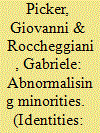

|
|
|
|
|
| Publication |
2014.
|
| Summary/Abstract |
This article expands the research on abnormalisation and the construction of social deviance of minorities. It focuses on the relationships between state practices, policies and expert knowledge addressing the Roma in Italy; it does so by first contextualising recent ethnographic findings on Turin authorities' social inclusion practices addressing Roma within the history of national and regional policies for Roma; it then contextualises those policies within the history of expert knowledge about Roma. Unlike what other studies on abnormalisation suggest, we argue that the abnormalisation of Roma in Italy is not primarily predicated upon the idea that they are at present unfit to follow the norms of the majority; rather, it stays upon a historically rooted representation of Roma oscillating between the poles of potential re-educability and potential dangerousness. In the conclusion we encourage further comparative research on abnormalisation, especially including practices and knowledge addressing other European minorities such as the Jews.
|
|
|
|
|
|
|
|
|
|
|
|
|
|
|
|
| 2 |
ID:
118582
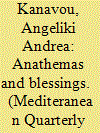

|
|
|
|
|
| Publication |
2012.
|
| Summary/Abstract |
This essay highlights the role of contingent provisions in the London-Zurich Agreements, which established the Republic of Cyprus, in damaging the future chances for a smoothly functioning state of affairs between the ethnic groups on Cyprus. By allowing contentious elements such as geographic division of municipalities, allocation of sovereign territory by a colonial power (the British), taxation and allocation of resources for the two communities to manage their affairs separately, the extent of integration of the armed forces, and the ratio of participation in the civil service, these provisions set up the young republic for turmoil. A powerful lesson emerges for constitutive arrangements as ethnic groups are driven to the negotiating table. The reluctance of drafters of agreements to address contentious issues sets up the conditions for reignition of conflict. To the extent issues are not addressed, a conflict simply continues by "other means," and peace is merely imagined.
|
|
|
|
|
|
|
|
|
|
|
|
|
|
|
|
| 3 |
ID:
126676
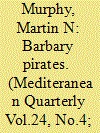

|
|
|
|
|
| Publication |
2013.
|
| Summary/Abstract |
This essay describes the piracy that took place in the Mediterranean from the time of ancient Greece to Barbary. It explains the corso, the sea war between nonstate but state-endorsed Christian and Muslim parties, with reference to the Knights of Malta and, more extensively, the Barbary corsairs. Although the essay focuses primarily on history, it also draws some conclusions about piracy and the international system today. The essay notes a prevailing assumption that contemporary piracy off Somalia and that perpetrated by the Barbary pirates is similar, but it further notes that any similarities are slight and superficial. At the same time, similarities rooted in economic, social, and political change do exist between all outbreaks of depredation at sea and the responses to them.
|
|
|
|
|
|
|
|
|
|
|
|
|
|
|
|
| 4 |
ID:
134224
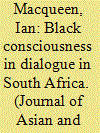

|
|
|
|
|
| Publication |
2014.
|
| Summary/Abstract |
This article examines a progressive moment under apartheid referred to retrospectively as 'the Durban moment' by activists. By exploring the friendship of assassinated activists Stephen Bantu Biko and Richard Turner, the paper calls for a nuanced assessment of the rich context of the emergence of Black Consciousness under apartheid, and shows how the rigid racial and ethnic categories imposed by the state could be challenged by creative and resourceful intellectuals. The paper draws on interviews, writings produced at the time, court transcripts and the secondary literature to argue that Black Consciousness was intimately linked on many levels to this progressive 'moment' in South Africa under apartheid, which has resonances for activists still today.
|
|
|
|
|
|
|
|
|
|
|
|
|
|
|
|
| 5 |
ID:
133579
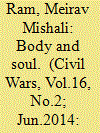

|
|
|
|
|
| Publication |
2014.
|
| Summary/Abstract |
The study presents an integrated model which places the link between the competing state-centric and sub-state explanations of civil strife. As state's capacity and communal fractionalization are typically tested in separate models, the combined framework aims to examine the premise of this article, that communal attributes affect the extent to which state capacity matters in preserving peace and security. The empirical analysis includes 1,385 instances of intrastate conflicts that occurred in 116 countries between 1995 and 2006, drawn from the Major Episodes of Political Violence and the Intra-State War datasets. The results of the study indicate that indeed the weakness of the body is substituted by the strength of the soul: the decline in state authority makes a larger room to sub-state groups, which shape internal dynamics. The second goal of the study is focused on the multifaceted nature of communal traits. Accordingly, the latter part the article offers an actor-oriented analysis, observing the relations between different ethnopolitical groups and violent strife. Based on the qualitative group assessment of the Minorities at Risk project, the study puts to test the argument that not all ethnic groups are alike in their potential to fracture communal solidarity and ignite civil war.
|
|
|
|
|
|
|
|
|
|
|
|
|
|
|
|
| 6 |
ID:
126780
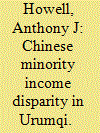

|
|
|
|
|
| Publication |
2013.
|
| Summary/Abstract |
Ethnic tensions between Uyghur and Han Chinese culminated in 2009 with the Urumqi riots, one of the bloodiest conflicts in Xinjiang's modern history, which left more than 200 people dead and another 1,700 injured. Following the 2009 Urumqi Riots, Chinese policy towards Xinjiang underwent a major shift, breaking away from its previous "gradualist" approach to one of economic development. In its place, China implemented policies meant to spur "leapfrog development" in Xinjiang. These new economic policies are likely to bring about rapid growth to the region; however, the question remains whether this growth will be equitably transferred amongst all ethnic groups and regions within Xinjiang.
|
|
|
|
|
|
|
|
|
|
|
|
|
|
|
|
| 7 |
ID:
129978
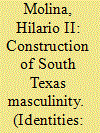

|
|
|
|
|
| Publication |
2014.
|
| Summary/Abstract |
I contend that masculinity formation in South Texas is linked to objects that have been deemed as 'manly'. This study is significant because it examines a group in the US population that, according to census predictions, account for a large percentage of the fastest growing and largest Latino group in the United States. This autoethnography research examines how pico de gallo - a type of salsa - and the barbeque grill assist working-class Mexican American males in constructing a masculine identity known as macho. The data are based on observing 30 social events in the Rio Grande Valley. The findings reveal a pursuit for an apex status of macho through these objects and the cultural transmission of gender roles to the next generation of males. This study concludes by offering suggestions in examining how masculinity, for men of colour, might be linked to marginalisation practices within a social structure.
|
|
|
|
|
|
|
|
|
|
|
|
|
|
|
|
| 8 |
ID:
138896
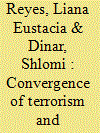

|
|
|
|
|
| Summary/Abstract |
This article examines the convergence among ethnic groups, narco-traffickers, insurgents, and terror organizations in Central Asia. It analyzes the lucrative business of drug trafficking and the diffusion of globalization, which have undoubtedly brought these once disparate groups together. It will explore how the increasing movement of illicit goods and people, proliferation of transportation technology, growing infrastructure, cooperative ethnicities, as well as a shared need for funding, have provided these groups with an opportunity to consolidate their efforts in ways that were not possible in the past.
|
|
|
|
|
|
|
|
|
|
|
|
|
|
|
|
| 9 |
ID:
128135
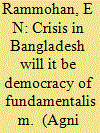

|
|
|
|
|
| Publication |
2013.
|
| Summary/Abstract |
Bangladesh was born in December 1971, after Pakistan rejected installation of the Awami League of East Pakistan, that had won the national elections held in end 1970 and then proceeded to crush democracy in East Pakistan by arresting the leaders of the Awami League and brutally suppressing its democratic movement. The Awami League and the people of East Pakistan were thus forced to resort to guerilla warfare and fight for independence. In this fight the Muslim population of East Pakistan got divided. Some Bengali Muslims who supported the fundamentalist right, sided with Pakistan in its attempt to crush the move for independence by the majority of Bengali Muslims.
|
|
|
|
|
|
|
|
|
|
|
|
|
|
|
|
| 10 |
ID:
131470
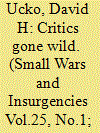

|
|
|
|
|
| Publication |
2014.
|
| Summary/Abstract |
The Western interventions in Iraq and Afghanistan have produced a heated polemic concerning the merits and demerits of counterinsurgency - the operational approach underpinning both campaigns. The two books reviewed here provide a good summation of the arguments against counterinsurgency: it is not a strategy and will fail when mistaken as such; its theory does not make intervention and war significantly easier; and even the most successful counterinsurgency campaigns have been bloody, violent, and protracted. Yet as this review highlights, beyond these central points, criticism of counterinsurgency is too often off the mark in its approach and totalizing in its pretentions. There is much to criticize and an urgent need to learn from past campaigns, yet bold claims and broad generalizations can mislead rather than enlighten. The analysis is particularly unhelpful when the definition of the central issue at hand - counterinsurgency - is being unwittingly or deliberately distorted. In the end, these two books form a poor basis for the debate that must now take place, because they are too ideological in tone, too undisciplined in approach, and therefore too unqualified in what they finally say.
|
|
|
|
|
|
|
|
|
|
|
|
|
|
|
|
| 11 |
ID:
120731
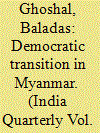

|
|
|
|
|
| Publication |
2013.
|
| Summary/Abstract |
Myanmar, earlier known as Burma, is on the cusp of a transition-a process that has to pass through formidable challenges and whose outcome is still quite uncertain. Five decades of military misrule have turned Myanmar that at one time used to be the richest into the poorest in South-east Asia and in a state of decline with an abysmal record in political, economic and social spheres. To recover from that decline, the country will need good governance, political reconciliation between the government and the opposition, between various ethnic groups and the government and the removal of long years of neglect of their aspirations and empowerment, between those opposition groups that remained within the country and the exiled groups, and finally, the goodwill and support of the international community. Aung San Suu Kyi, Myanmar's democratic leader, has joined the political process and has become the leader of the opposition in the army-dominated parliament. She also faces formidable challenges, as she has to reconcile the wide expectations of people who still consider her as a political activist fighting for the cause and the imperatives of being a constructive politician who has no other option other than pragmatic reconciliation. Relations with China are one issue that will also impinge on future of democracy in the country.
|
|
|
|
|
|
|
|
|
|
|
|
|
|
|
|
| 12 |
ID:
130919
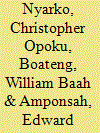

|
|
|
|
|
| Publication |
2014.
|
| Summary/Abstract |
The success of individuals in securing employment requires a significant search effort. This article presents an empirical analysis of the determinants of job search intensity among a cross-section of workers in Accra, Ghana. Based on a sample of 404 workers drawn from 100 formal sector firms in Accra, we adopt the Poisson regression estimation technique to indicate that age, years of schooling, labour market experience, sex of household head, firm size and ethnic group significantly influence job search intensity. Measures to expose young job seekers to the world of work via internship and apprenticeship could accelerate their transition to employment.
|
|
|
|
|
|
|
|
|
|
|
|
|
|
|
|
| 13 |
ID:
119721
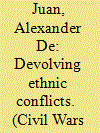

|
|
|
|
|
| Publication |
2013.
|
| Summary/Abstract |
Institutions can contribute to regulating interethnic conflict; however, in many cases, they fail to bring about lasting peace. The article argues that the negligence of subgroup identities accounts for some of this failure. Ethnic groups are often treated as unitary actors even though most consist of various linguistic, tribal, or religious subgroups. When interethnic conflict is settled, subgroup differences may come back to the fore. This 'resurgence' can lead to subgroup conflict about the political and economic resources provided through intergroup institutional settlements. This can in turn undermine the peace-making effect of intergroup arrangements. Different subgroup identity constellations make such destructive effects more or less likely. The article focuses on self-government provisions in the aftermath of violent interethnic conflict and argues that lasting intergroup arrangements are especially challenging when they involve 'contested' ethnic groups.
|
|
|
|
|
|
|
|
|
|
|
|
|
|
|
|
| 14 |
ID:
120874
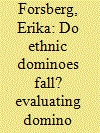

|
|
|
|
|
| Publication |
2013.
|
| Summary/Abstract |
There is a commonly expressed concern that granting territorial concessions to separatist groups may create "domino effects." However, although this statement is largely undisputed within political rhetoric, no firm conclusions have been provided in previous research. The purpose of this study is to systematically examine whether the granting of territorial concessions to an ethnic group does indeed spur new separatist conflicts. I suggest that such domino effects may be generated by two processes. First, the accommodation of an ethnic group's separatist demands may trigger a general inspiration process among other groups within and across borders. Second, by acquiescing to separatist demands, a government signals that it may also yield to the demands of other groups it confronts, making it more likely that other groups choose to pursue secessionism. Statistical analysis of data on territorial concessions globally 1989-2004 provides no evidence of domino effects. This holds true both within and across borders.
|
|
|
|
|
|
|
|
|
|
|
|
|
|
|
|
| 15 |
ID:
127058
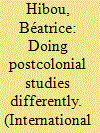

|
|
|
|
|
| Publication |
2013.
|
| Summary/Abstract |
Mohamed Tozy is certainly one of the better known Moroccan intellectuals in the Arab world and in Europe, in particular for his publication of the book Monarchie et islam politique au Maroc (Monarchy and Political Islam in Morocco) which is a classic in social sciences and political studies.2 He is a Professor at the Institute of Political Science (Institut d'Etudes Politiques, IEP) in Aix-en-Provence and at the Hassan II University in Casablanca and also a researcher at LAMES (LAboratoire MEditerranéen de Sociologie) of the Maison Méditerranéenne de Sciences Humaines d'Aix-Marseille as well as at CHERPA (Croyance, Histoire, Espace, Régulation Politique et Administrative). In 2005, he set up the Centre Marocain des Sciences Sociales (CM2S), which is the first one of its kind in social sciences in Morocco to have included a doctoral school. He is presently in the process of setting up a faculty for social sciences at the Mohamed VI polytechnic University
|
|
|
|
|
|
|
|
|
|
|
|
|
|
|
|
| 16 |
ID:
142131
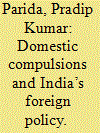

|
|
|
|
|
| Summary/Abstract |
We have to bring some sort of rough consensus among all the groups, political parties, ideological groups, ethnic groups regarding number of domestic issues. Rather our differences of opinion should not be known to outside. It must be solved within. Then only we can think of a strong foreign policy having rooted in domestic issues, with more or less consensuses among all the stakeholders. Today, as India itself has moved to the center of global politics with an increase in its economic and military capabilities, it is being asked to become a stakeholder. India is a rising power in an international system that is in flux, and it will have to make certain choices that probably will define the contours of Indian foreign policy for years to come. The stakes are too high for India as well as the international community.
|
|
|
|
|
|
|
|
|
|
|
|
|
|
|
|
| 17 |
ID:
129469
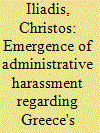

|
|
|
|
|
| Publication |
2013.
|
| Summary/Abstract |
This article is based on official, recently declassified documents to provide an analysis of the emergence of policies of discrimination applied against the Turks of Greek Thrace. It does this by unveiling the efforts of the local authorities to construct a coherent political project that would block the expansion of Turkish nationalism among minority Muslims. After certain historical events, this project became even more exclusionary. Crucial in this direction was the establishment of a secret, official council, its operation described here. The projects it formulated and put forward were decisive for the establishment of a regime of practices of administrative harassment, applied in Greek Thrace until the early 1990s but never officially recognized
|
|
|
|
|
|
|
|
|
|
|
|
|
|
|
|
| 18 |
ID:
139921
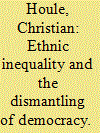

|
|
|
|
|
| Summary/Abstract |
Does inequality between ethnic groups destabilize democracies? While the literature largely agrees that inequality harms democracies, previous studies typically focus on the overall level of inequality in a society, leaving unanswered questions about the effect of inequality between ethnic groups. This article fills this gap and argues that inequality between ethnic groups harms the consolidation of democracy but that its effect is strongest when inequality within groups is low. Using group- and country-level data from more than seventy-one democracies and 241 ethnic groups worldwide, the author conducts the first cross-national test to date of the effect of ethnic inequality on transitions away from democracy. Results provide support for the hypothesis: when within-ethnic-group inequality (WGI) is low, between-ethnic-group inequality (BGI) harms democracy, but when WGI is high, BGI has no discernable effect.
|
|
|
|
|
|
|
|
|
|
|
|
|
|
|
|
| 19 |
ID:
129468
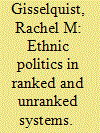

|
|
|
|
|
| Publication |
2013.
|
| Summary/Abstract |
This article explores how ethnic politics may operate differently in societies with "ranked" versus "unranked" ethnic systems, where ethnicity and class correlate closely versus very little. It focuses on two hypotheses suggested, but not tested, in Donald Horowitz's Ethnic Groups in Conflict. Their plausibility is explored in seven brief case studies of electoral politics in South America and Southern Africa. The analysis suggests that theories of ethnic politics that fail to take class into account are problematic for the study of ranked societies in particular.
|
|
|
|
|
|
|
|
|
|
|
|
|
|
|
|
| 20 |
ID:
128867
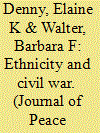

|
|
|
|
|
| Publication |
2014.
|
| Summary/Abstract |
If a civil war begins, it is more likely to be initiated by an ethnic group than any other type of group. We argue that ethnic groups, on average, are likely to have more grievances against the state, are likely to have an easier time organizing support and mobilizing a movement, and are more likely to face difficult-to-resolve bargaining problems. We further argue that each of these factors was likely due to three pre-existing patterns associated with ethnicity. First, when political power is divided along ethnic lines, ruling elites can disproportionately favor their own ethnic group at the expense of others. This creates grievances that fall along ethnic lines. Second, ethnic groups tend to live together in concentrated spaces, sharing the same language and customs, and enjoying deep ties with ethnic kin. This means that ethnic groups, if they are aggrieved, will have an easier time mobilizing support to demand change. Third, the fact that ethnic identity tends to be less elastic than other types of identity means that credible commitments to any bargain - before and during a conflict- will be more difficult to make. The result is that ethnic groups will have a greater number of reasons, opportunities, and incentives to mobilize and fight than non-ethnic groups.
|
|
|
|
|
|
|
|
|
|
|
|
|
|
|
|
|
|
|
|
|